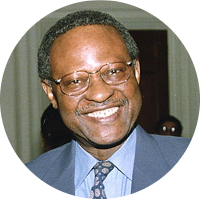
Chief Emeka Anyaoku CON
Chief Eleazar Chukwuemeka (Emeka) Anyaoku was born on 18 January 1933 in Obosi, Nigeria. Not only is he a chief through line-age, but also through his exceptional leadership skills.
His career in leadership spans many decades and institutions, both national and internationally. The promotion of democracy on the African continent has always been his primary focus and an area of concern. His precociousness in leadership showed when he joined the Commonwealth Development Corporation at the tender age of 26, in 1959.
Shortly after the Nigerian independence, the new Government invited him to join the country’s diplomatic service. In 1963, he was posted to Nigeria’s Permanent Mission at the United Nations (UN) in New York.
After the establishment of the Commonwealth Secretariat, Chief Anyaoku became assistant director of international affairs. He was seconded to the organisation by the first Secretary General, Arnold Smith of Canada. He later became a director and by 1975, Chief Anyaoku became Assistant Secretary General. In 1977, Commonwealth governments elected him Deputy Secretary General with responsibility for international affairs and the Secretariat’s administration.
His commitment to Africa remained with him and in 1983, Chief Anyaoku returned to Nigeria to serve as the country’s foreign minister. On the overthrow of the Government by the military, he went back to his Commonwealth position as deputy secretary general. In 1989, Chief Anyaoku was elected the third Commonwealth Secretary General.
He proved an indispensable leader in matters of national, continental and international political leadership and was re-elected at the 1993 Limassol Commonwealth Heads of Governments Meeting for a second five-year term.
His career as a leader spans over 30 years of Commonwealth initiatives and negotiations. He does not avoid dealing which matters that are controversial. Chief Anyaoku’s strength in leadership can be seen in his active involvement in issues such as the Gibraltar referendum of 1967, the Nigerian civil war of 1967 to 1970, the St Kitts-Nevis-Anguilla constitutional crisis of 1969 to 1970, the problems following Commonwealth Games’ boycotts during the 1980s and the process leading to peace and democracy in Zimbabwe, Namibia and, in particular, South Africa.
Chief Anyaoku was also closely involved in the establishment of a joint office in New York for small Commonwealth countries that are thus enabled to be represented at the UN.
